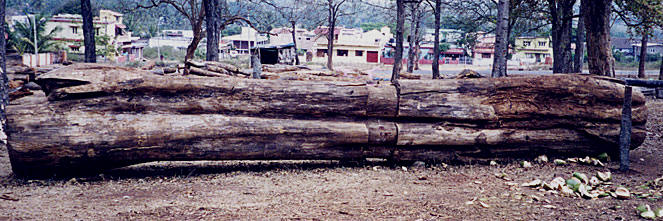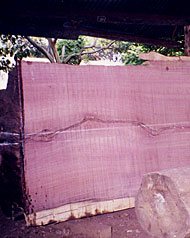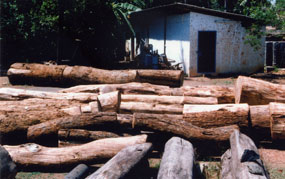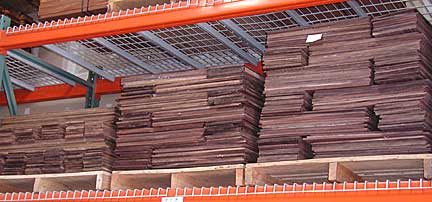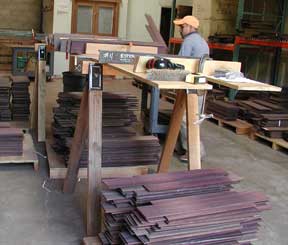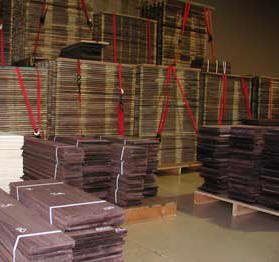INDIAN ROSEWOOD
HOME ORDER ONLINE PRODUCTS REGISTER CONTACT US

Several years ago, logs like this were not uncommon. This is about a 4-1/2 foot log, photo taken some 8 years ago. Below left, is the above log after splitting. Just in the foreground is a more typical rosewood log, as are those logs in the photo on the right, photo taken in 2005.

Indian Rosewood Update (2005)
We mention on our Indian rosewood page what we're looking for these days in guitar wood. It boils down to beauty rather than perfectly straight grain and quartersawn-ness. Beauty, which might include a tight knot or some pinholes even. The reasons would appear to be obvious, but allow me to fill in some blanks with the "buzz" I'm hearing. I don't have a means to substantiate the numbers I've been given, but I think the trend is easy enough to see in the quality of wood we are getting these days.
In India there are five Indian rosewood log auctions every year, which, in the last couple of years have averaged around 6000 cubic meters of logs being available. In guitar and veneer grade wood, this may yield anywhere from 100M3 to 250M3 per 1000M3. As another indicator, at the most recent auction there were 945M3 of logs, of which 75M3 were select logs, for instrument/veneer grade material. Now, this may not mean much to you (it doesn't mean much to me), but about 10 years ago, the auctions offered nearly three times the logs, of which 70% to 80% were select logs, yielding a maximum of 40% guitar/veneer grade wood.
In other words, these days, it's common to get about a 10% yield, up to maybe 20% on a particular auction; 10 years ago, 40% yield was common, not only because the logs were bigger, but as mentioned above, there were about three times as many logs available. A further note on the changing times, around 10 years ago there were 35 to 40 Indian rosewood exporters. These days, there are 13 exporters, of which 7 or 8 are exporting real numbers.
Further compounding the limited amounts of Indian rosewood are the current and increasing demands of China. Your beloved author has been to China a number of times in the last 2 years, and the quality of guitars seems to increase either logarithmically or exponentially, I'm not sure which. Suffice it to say, the best factories are producing guitars for many of the major U.S. and Japanese companies, and the quality is beginning to rival what's coming out of the U.S. (They are also beginning to export under their own names.)
A year ago we shipped from our mill in India 500 sets to one company, and this year we're shipping 2000 sets to them. Another company took 3000 A grade sets from us this year, and we have a large pending order with them for ebony fingerboards.
The numbers I'm hearing hover around 3,000,000 guitars produced in China in 2005. Most of these are inexpensive plywood guitars, but there are murmurs of overproduction in China, with possibilities that some of the factories will be forced to close their doors. However, the accepted wisdom seems to be that to counter this possibility the quality levels must come up, and solid wood must be used. Need I say more?
The head of one of the biggest and best factories (the Blueridge guitar is one of theirs) asked me about the future of solid woods for backs and sides, and I had to think that the change they've made over to solid woods from veneers may have been too hasty. But with their experience, and the likelihood that the entire industry (I speak of factories, here) will have to move back to veneers for backs and sides in the not too distant future, will give them a running start.
Santiago matches Indian rosewood sets.
Indian rosewood sets stickered and ready for the kiln.
Cameron and Estelle match sets.
BUYING FROM INDIA DIRECT
If you would like to buy directly from India we can arrange to have goods drop-shipped from our partner. We shipped them a kiln and a wide belt sander last year and they are now up and running with the ability to dry, skim-sand and match (the only rosewood vendor in India with this ability). There are other vendors in India offering to sell directly to US customers. To be frank, the quality from vendor to vendor is about the same, and the prices are about the same within about $2 either way. For example, you might find a vendor that will offer you A-grade Indian rosewood sets at around $28—$32 CIF US port. At first blush this seems like a good price, and it is. But if you put your pencil to paper, you have to wonder how much you really save. You will still have internal freight from the port to your destination. You still have to unpack and check for defect, sticker and (kiln) dry, then sand for matching, and then match. In our many years of experience, we've found that in a shipment of say a 100 sets, at best you'll maybe find 50 that you can match up. So you have to order again, and again, and again, to get good grain and color matches. There is usually some fall-down as well. You then have inventory carrying costs, time spent away from building dealing with the wood.
It would seem that it makes sense only for the factories to order directly from India but in fact, we also supply a number of the larger factories because they understand full well all the peccadilloes that translate to increased costs when buying directly. Finally, if you have a problem with something we send you, we'll always accept returns. This is very difficult to do when buying directly from India.

Address General Information Sales/support Telephone:
707-431-3760 POB 217, 101 C Grant Avenue, Healdsburg, Ca. 95448 USA info@alliedlutherie.com sales@alliedlutherie.com Fax:
707-431-3762
